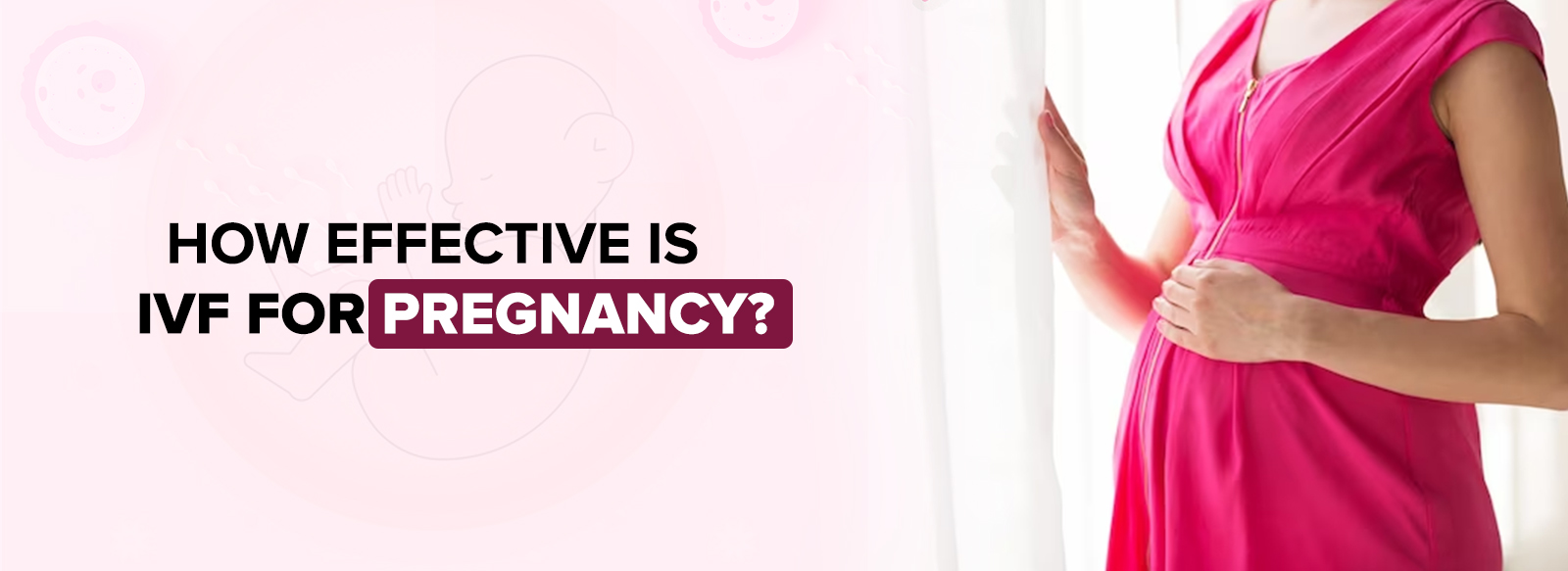In-vitro fertilisation is a medical technique used to help couples who are unable to conceive. In fact, the fertility rate in India is continuously dropping drastically. From 2.179 in 2020, a drop of 2.6% in just 3 years, to 2.122 in 2024. The more people get infertile, the more the need for such fertility options increases.
Because of the poor lifestyle, unhealthy diet, and unawareness of infertility, the fertility rate is dropping. On the other hand, the effectiveness of fertility treatments like IVF is becoming more and more prominent. The average success rate of IVF pregnancies in India ranges from 60% to 85%, depending on multiple factors.
This content aims to educate you on different aspects of IVF effectiveness, such as age, fertility approach, number of cycles, and how you can increase the chance of live birth in IVF.
Why is IVF (In-vitro fertilisation) Effective in India?
India performs roughly 2-3 lakh IVF cycles per year and estimates a 20% exponential growth over the next 5-7 years. The number of IVF treatment centres in India is estimated to be more than 2600+ centres and clinics. This shows the promising growth of fertility treatment options and the number of infertile patients in the country. Here are a few reasons why IVF is effective in India –
Growing Popularity: As more Indian couples deal with infertility, IVF is becoming more and more common. The increased demand for fertility treatments is a result of various factors, including postponed marriages, changing lifestyles, and environmental factors.
Modern Medical Facilities: India has made great strides in the development of its medical infrastructure, and a number of hospitals and specialised fertility clinics there provide cutting-edge IVF procedures. Top-notch fertility centres can be found in major cities like Bangalore, Chennai, Delhi, Mumbai, and Pune.
Cost-Effective Options: One of the reasons for the popularity of IVF in India is the comparatively lower cost of treatment compared to many Western countries. This has led to medical tourism, with people from other countries coming to India for affordable fertility treatments.
Doctors with Experience and Skill: India has a large pool of highly skilled and experienced embryologists and fertility specialists who help IVF treatments succeed. International training and certification in reproductive medicine has been awarded to numerous physicians.
What is the Effective Rate of IVF by Age in India?
The effectiveness of fertility treatment options depends on various factors, such as the age of the woman, the cause of infertility, and the quality of the embryos. The success rate is the most important factor to consider effectiveness in the country, and in India, the average IVF success rate is 60% to 70%. However, it varies based on the age and health of the candidates.
Since success rates are often reported as the percentage of cycles resulting in a live birth. Here’s a general overview:
- Under 35 Years of Age: Women under the age of 35 typically have higher success rates with IVF. Success rates in this age group may range from around 40% or higher.
- 35-37 Years of Age: Success rates may slightly decline in the 35-37 age group but can still be favourable. The range might be around 30-35%, varying between clinics.
- 38-40 Years of Age: IVF success rates tend to decrease as women age, especially after 38. Success rates may be around 20-25%, but individual cases can vary.
- 41-42 Years of Age: Success rates further decrease in the early 40s. The range might be around 10-15%, but success becomes more challenging.
- Over 42 Years of Age: Women over the age of 42 face even lower success rates with IVF. Success rates may drop below 5%, and the chances of success are notably reduced.
Correlation between Number of IVF Cycle and It’s Effectiveness:
The number of cycles in an IVF treatment directly affects its efficacy. In India, some patients have a success rate of more than 90% after an average of two or more cycles. But it is crucial to realise that factors other than age matter, such as the quality of the embryo and the individual’s present state of health. An IVF cycle can last between two and four weeks and consist of several steps, including ovarian egg extraction, laboratory fertilisation, and return of the fertilised eggs to the uterus.
Some couples become pregnant after the first cycle of IVF, while others may require multiple cycles. Moreover, candidates who have previously tried unsuccessfully with IVF should be given extra thought and caution.
Tips to Increase Effectiveness of pregnancy in IVF:
Followings are some tips to increase the success rate and effectiveness of in-vitro fertilisation (IVF) to get pregnant:
- Prioritise leading a healthy lifestyle that includes a balanced diet and frequent exercise.
- Recognise how age affects the success of IVF and, if necessary, take fertility preservation into consideration.
- Select a reliable fertility centre with highly successful outcomes and knowledgeable specialists.
- Get a complete pre-IVF examination to take care of any underlying medical issues.
- To increase the likelihood of a successful pregnancy, think about genetic testing for embryos.
- Examine and apply lessons learned from past IVF cycles to enhance subsequent attempts.
Conclusion:
The effectiveness of IVF is directly linked to the overall success rate of this fertility treatment, and the greater the success rate, the more effective it is. The chance of success in IVF differs based on the candidate’s age, previous health conditions, hospital expertise, and cause of infertility. On average, the IVF pregnancy rate is 60% and can go up to 90% in multiple cycles. India’s young population is continuously growing and changing lifestyles, bad eating habits, and common sexual mistakes, making the younger generation less fertile. Not just in 2024, but in the upcoming years, demand for IVF hospitals will definitely grow. So, due to demand, IVF clinics are getting more and more modernised and advanced, increasing the effectiveness of IVF in the country.


